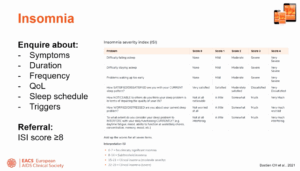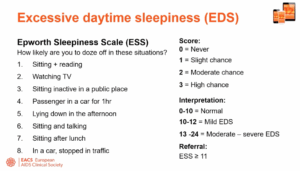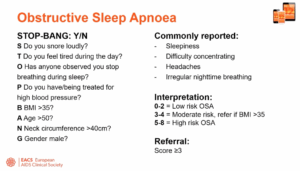Sleep disorders and quality of sleep added to EACS management guidelines
6 November 2025. Related: Conference reports, Guidelines, Coinfections and complications, EACS 20 Paris 2025.

Simon Collins, HIV i-Base
One of the new sections in the updated EACS guidelines includes a new section on sleep disorders.
The clinical impact of poor sleep has led to a new recommendation to ask a simple question: ‘How is your sleep?’
This recognises that people living with HIV commonly have sleep problems which can independently have poor clinical outcomes, irrespective of whether or not HIV has a causative role.
This first question should be asked when starting or changing ART and additionally every two years as part of routine management.
Three short validated screening tools are then recommended for insomnia, excessive daytime sleepiness and sleep apnoea when abnormal symptoms are reported.
The Insomnia Severity Index (range 0 to 28) involves seven questions that cover sleep quality and impact on quality of life, with a five-point scale and a score >7 to prompt further referral.
The Epworth Sleepiness Scale (range 0 to 24) asks likelihood of sleeping in eight situations, with a 3-point rating and a score >10 prompting referral.
Lastly, the STOP-BANG questionnaire (range 0 to 8) uses eight questions (with yes/no answers) and a score >2 indicating moderate risk to prompt referrals.
The guidelines also include identifying modifiable risk factors, including:
- Mental health (depression, anxiety).
- Alcohol excess and recreational drug use.
- ART considerations:
- avoid efavirenz-based regimens in those with symptoms of poor sleep.
- dose second-generation integrase inhibitors in the morning rather than evening.
- Review concomitant medication for drugs which may cause sleepiness, such antihistamines, benzodiazepines, antidepressants, opioid pain medication, muscle relaxants and some blood pressure medication.
- Weight and body habits review and advice on diet and exercise.
- Suboptimal sleep habits.
The EACS guidelines are now hosted on the Stanford website and are no longer produced in print or PDF format. [2]
The section on sleep health is included in the section on complications, together with information on cognition, mental health and substance use. [3]
References
- EACS guidelines. Special session. Thursday 22 October 2025 (5.30 am).
https://player.vimeo.com/video/1128297512?h=b4f77cca47&title=0&byline=0&portrait=0&badge=0&autopause=0&player_id=0&app_id=58479 - EACS Guidelines 2025. Versions 13.0, October 2025.
https://eacs.sanfordguide.com - EACS guidelines. Sleep disorders. (October 2025).
https://eacs.sanfordguide.com/en/eacs-part2/eacs-cognition-mental-sleep-health-substance-use/sleep-disorders




